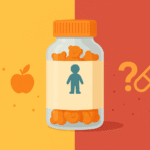The Role of Supplements in Mental Health Support

Mental health challenges like stress, anxiety, and depression are rising globally, including in Africa. While therapy, medication, and lifestyle changes remain the foundation of treatment, supplements are gaining attention as natural support tools for brain health and emotional wellbeing.
But how effective are supplements in supporting mental health? Let’s explore the science, benefits, and safe use of some key nutrients.
Key Supplements for Mental Health
1. Omega-3 Fatty Acids
-
Found in fish oil and flaxseed.
-
Improve brain function and may reduce depression symptoms.
-
Linked to better focus and reduced mood swings.
2. Vitamin D
-
Often called the “sunshine vitamin.”
-
Low levels are associated with depression and seasonal mood changes.
-
Supplements help improve mood and immunity.
3. Magnesium
-
Supports relaxation and nerve function.
-
Deficiency linked to anxiety, stress, and insomnia.
-
Magnesium-rich diets or supplements may improve sleep quality.
4. B Vitamins (B6, B9, B12)
-
Essential for brain chemistry and energy production.
-
Deficiency can lead to fatigue, low mood, and irritability.
-
Supplements support mental clarity and resilience.
5. Herbal Remedies (Ashwagandha, St. John’s Wort)
-
Ashwagandha helps lower stress hormones (cortisol).
-
St. John’s Wort may relieve mild to moderate depression.
-
Should be used with caution due to potential drug interactions.
Myths About Supplements and Mental Health
-
Supplements can replace therapy or medication – False. They should complement, not substitute, professional treatment.
-
All supplements work instantly – False. Some take weeks to show effects.
-
Natural always means safe – False. Herbs can interact with medications or cause side effects.
Risks of Using Supplements for Mental Health
-
Unregulated products may contain unsafe ingredients.
-
Over-supplementation can cause imbalances or side effects.
-
Delayed treatment – relying only on supplements may worsen serious conditions.
When Supplements May Help
-
Mild stress or anxiety – Omega-3, magnesium, or herbal remedies may provide support.
-
Seasonal depression – Vitamin D supplements can help during low sunlight seasons.
-
Nutrient deficiencies – Correcting vitamin or mineral gaps improves brain function and mood.
Safe Use Guidelines
-
Consult a healthcare professional before starting any supplement.
-
Use trusted brands with third-party testing.
-
Combine supplements with lifestyle changes – exercise, sleep, and mindfulness.
-
Track progress to see what works best for your mental health.
Conclusion
Supplements can play a valuable role in supporting mental health, especially when addressing deficiencies in vitamin D, omega-3, magnesium, and B vitamins. Herbal remedies also show promise, but safety and professional guidance are essential.
However, supplements should never replace proven treatments like therapy, prescribed medication, or lifestyle improvements. Instead, they should be part of a holistic mental health plan that combines nutrition, medical care, and self-care practices.
By using supplements wisely, Africans and people worldwide can boost resilience, reduce stress, and improve overall wellbeing.
Written by Fawzi Rufai, Medically Reviewed by Sesan Kareem



